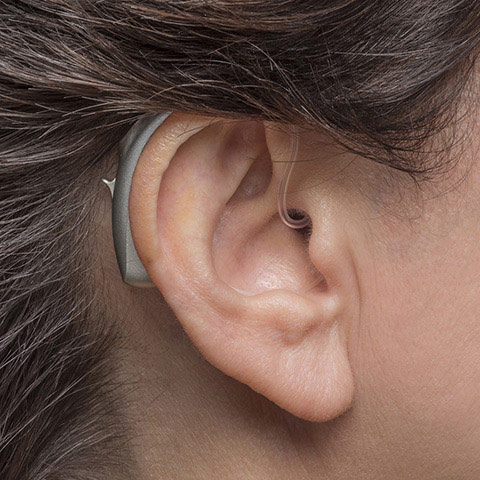



What is Hearing Loss?

What is Tinnitus?
Tinnitus is a very common hearing issue which affects more than 15% of all people and is characterized by a patient hearing noise that isn’t happening externally – typically described as a ringing, buzzing, roaring, clicking, hissing, or humming sound in the ears and/or head. The sound may be intermittent, constant or fluctuant, mild or severe, and may vary from a low roaring sensation to a high-pitched sound. While 80% of those suffering from Tinnitus also have hearing loss, tinnitus is not necessarily associated with hearing loss. Overwhelmingly, cases of tinnitus fall into the Subjective Tinnitus category, meaning that the patient is the only one who hears the noise. As such, the reported distress can be difficult to record or appreciate by others.
Tinnitus is a symptom rather than a disease, just as pain in the arm or leg is a symptom and not a disease. There are many causes related to the ear which could result in tinnitus, from simple ear wax in the canal to middle ear abnormalities. Otosclerosis (fixation of the stapes bone in the middle ear) can cause tinnitus, as can fluid in the middle ear. Meniere’s disease is a common example of a cause for tinnitus. Sudden trauma to the inner ear such as exposure to excessively loud sounds may result in tinnitus. 60% of veterans returning from combat in Iraq and Afghanistan report symptoms of tinnitus, often due to excessive noise exposure. Tumors on the hearing nerve or other problems in the brainstem or central nervous system may also cause tinnitus. In addition, other vascular abnormalities in the skull or base of the skull may result in tinnitus.
Treatment of Tinnitus
Tinnitus Retraining Therapy (TRT) trains the brain to habituate (ignore) the tinnitus sound. Patients wear ear level sound generators on a daily basis for 6-12 months and longer if necessary. The sound generator emits a low-level white noise that mixes with the perception of tinnitus. This, in combination with ongoing audiological support to understand the impact of the negative emotional connection will give most patients permanent relief from tinnitus symptoms. Often, the patient chooses other alternative treatments to use with TRT at their discretion, which are completed independently. An example of this additional treatment would be biofeedback training, which can be effective in reducing tinnitus and improving coping skills in many patients. Biofeedback training involves controlling varying parts of the body and relaxing muscles.
Other measures to manage tinnitus include taking efforts to limit anxiety, obtain adequate rest, and avoid over fatigue – all conditions which generally exacerbate tinnitus symptoms. Managing stress through popular methods like exercise and meditation is especially important. Whatever additional treatment options a patient chooses must be completed on a daily basis. As you begin to manage stress carefully, you will understand how anxiety and negative emotions fuel the perception of tinnitus.
While there are medications which have been utilized to suppress tinnitus, some patients benefit from these drugs and others do not. Each patient has an individual response to medication, and what may work for one patient may not work for another. Some of these medications have been proven to decrease the intensity of tinnitus in some patients. There is, however, no drug anywhere which will cure tinnitus completely and forever. In addition, it should be noted that there are some drugs which will cause tinnitus. If you have tinnitus and are on medication, you should discuss the symptom of tinnitus with your physician.
A Summary of The Causes of Tinnitus
Tinnitus may originate from various lesions and from different sites. The auditory system involves highly complicated inner ear structures, many afferent and efferent nerve pathways and a great number of nuclei that form a complex meshwork. To pinpoint tinnitus to a certain structure becomes questionable. This is demonstrated by patients who have had intractable tinnitus after having surgery on their ear or incurring severe diseases of the ear. In an attempt to relieve the tinnitus, cutting the auditory nerve has been done and yet the tinnitus was persistent, indicating the site of lesion causing the tinnitus must have shifted into the central nervous system.
Tinnitus could be explained by abnormal neural activity in the auditory nerve fibers, which may occur if there is a partial breakdown of the myelin covering of individual fibers. A defect in the hair cell would trigger the discharge of connected nerve fibers. For chronic cochlear disorders, there may also be increased spontaneous activity in the hair cells and neurons resulting in tinnitus. In the auditory nerve there are two different kinds of afferent fibers: Inner hair cell fibers with large diameters and outer hair cells fibers with small diameters. Thus, loss of signals from the cochlea might trigger tinnitus as a manifestation of a functional imbalance between the two sets of fibers. In addition, other abnormal changes of the cochlear fluids may result in tinnitus.
There is not one type, one site or one origin of tinnitus, but a multitude of types, sites, and origins. It is also unlikely that one hypothesis on the cause of tinnitus could explain all the features.
